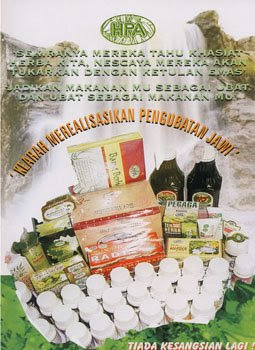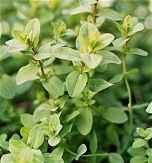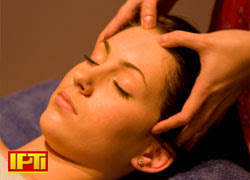Wednesday, September 30, 2009
Monday, May 4, 2009
BENGKEL PERUBATAN ISLAM
BENGKEL ini akan diadakan seperti berikut :
TARIKH : 16/5/2009
HARI/MASA : SABTU/8.00 PAGI-12.30 TGHARI
TEMPAT : DEWAN JAMI'YYAH BEHOR CHICAR,
BATI 3 1/4, JALAN KAKI BUKIT, PADANG PAUH,
01000 KANGAR, PERLIS.
MODUL : PEMAKANAN DAN MINDA / MAKHLUK HALUS
YURAN : HANYA RM 10.00 SAHAJA.
SIJIL : DIBERIKAN KEPADA YANG BERMINAT (TAMBAHAN RM 10.00 SAHAJA)
PENDAFTARAN :
012-400 6548 (USTAZ IDRIS)
013-408 4474 (ZALI)
TARIKH : 16/5/2009
HARI/MASA : SABTU/8.00 PAGI-12.30 TGHARI
TEMPAT : DEWAN JAMI'YYAH BEHOR CHICAR,
BATI 3 1/4, JALAN KAKI BUKIT, PADANG PAUH,
01000 KANGAR, PERLIS.
MODUL : PEMAKANAN DAN MINDA / MAKHLUK HALUS
YURAN : HANYA RM 10.00 SAHAJA.
SIJIL : DIBERIKAN KEPADA YANG BERMINAT (TAMBAHAN RM 10.00 SAHAJA)
PENDAFTARAN :
012-400 6548 (USTAZ IDRIS)
013-408 4474 (ZALI)
Monday, August 4, 2008
SIJIL HERBALIS (JARAK JAUH KPJ)

Pelajari ilmu-ilmu herba secara PJJ dengan Kolej Perubatan Jawi, sebuah pusat latihan herba terkenal di Malaysia di bawah HPA.
LAYARI LAMAN WEB KOLEJ PERUBATAN JAWI
URL : http://hpa.com.my/kpj/
Wednesday, November 7, 2007
ARTIKEL DALAM ISLAM ON-LINE
The traditional world of healing (naturopathic) is developing a healthy partnership with many areas of allopathic medicine (Western). One such area is the study of the role the human psyche plays in healing.
After being trained in complementary medicine, Drs. Reilly and Taylor have said, "I now see the whole person and not a biochemical puzzle to be solved" (Reilly, p.1). Ibn Sina (Avicenna), the Muslim philosopher and physician, made the same proclamation over a thousand years ago when he stated that the body of man is intricately related to the human soul. "The body and soul form one complete whole - one single being" (Nasr, p.252). These theories seem to ring true because, as we know, we cannot begin to know Allah (SWT) until we truly know ourselves.
Alternative medicine is often called "energy medicine" because of the emphasis it places on the human psyche. Energy medicine involves the concept of "vibrational healing" and is practiced by many cultures all over the world. It contributes to the development of bio-electromagnetic resonance. The clinical applications of energy medicine include psychobiological treatments, as well as therapy geared toward the prevention and management of acute and chronic illnesses, and can help lead to a fuller understanding of the interrelationships of the environment and nature on man (Korn, p.1).
Energy healing can involve spiritual healing or other mental healing exercises. Among the American population, 75% of studies show a positive association between spirituality and health including depression, substance abuse, and coping and recovery from illness and mortality (Anandarajah and Hight, p. 2).
Naturopathic forms of healing work with energy systems and use the body as a vehicle to eliminate and remove negative spiritual and physical toxins caused by emotional blockages, tension and general toxicity build-up.
"This area of psychological and spiritual intervention is essentially untapped," says Porter Storey, MD, Medical Director of Hospice at the Texas Medical Center. "It can dramatically improve a lot of parameters in patients much more effectively than expansive medications and it has essentially no bad side-effects" (Foubister, p. 1).
This argument is supported to some extent by Dr. Zelda Di Blasi who says, "In a healthcare consultation, doctors can offer social support to patients, give them a safe space to open up, discuss their problems and reassure them with a diagnosis or a treatment, thereby relaxing them and lowering anxiety... All of these ingredients have been linked with immune function."
Dr. Di Blasi is the author of a study in last month's Lancet which found that, "Doctors who showed empathy and acknowledged their patients fear and anxieties were more effective than those who kept patients at arm's length" (Rostler, p.1).
"The fear that we will turn medicine into nothing but a business is going to fuel ongoing interest in addressing the humanistic dimensions of care, of which forgiveness is one," says Stephen P. Bogdewic, Vice Chair of Family Medicine and Assistant Dean for Primary Care Education at Indiana University School of Medicine (Foubister, p. 3).
So at a time when we are losing the wealth that Allah (SWT) has blessed us with, more people are waking up to what has been revealed in the past. Dr. Howard Frumkin, professor of occupational and environmental medicine at Emory University's Rollins School of Public Health in Atlanta, states, "The plantation of trees or any vegetation anywhere, is the first step towards empathy in the environment. Their therapeutic qualities have been known for a long time to reduce stress. In addition, they clean the air of toxins and create visual and nasal qualities that have an impact on our sensibilities like balm to the soul." All forms of vibrational or energy healing seek to unify the conscious and the subconscious, and the lower self and the higher selves with Allah (SWT).
By bringing our bodies into balance physically, physio and socio-biologically, and psycho-spiritually, we realize who we truly are and we are better able to understand the Divine Will of Allah (SWT).
Sources:
Anandarajah, Gowr & Hight, Ellen. "Spirituality and Medicine Practice." American Academy of Family Physicians (2001).
Foubister, Vida. "Broadening the Role of Forgiveness In Medicine. AMNews. (Aug. 2000).
Korn, Leslie. " Energy Medicine ". Center for World Indigenous Studies (2001).
Lyman, Francesca. " Nature's Medicine ".
Nasr, Seyyed Hossein. Islamic Cosmological Doctrines. Britain: Thames & Hudson. 1978.
Reilly, David. "Enhancing Human Healing". British Medical Journal. (Jan 2001).
Rostler, Suzanne. "Empathy, Warmth Can Be Potent Medicine." Reuters Health.

WHY CHOOSE HERBS?

Malaysian Bomoh Practitioners a Dying Breed
By Sohieb Jasem
Malaysian BomohTraditional healing in Malaysia is not limited to utilizing therapeutic, physical means or to prescribing a dose of medicine or herbs; it is a holistic approach that caters for the spiritual and psychological needs of patients, together with all other modes of treatment.
Regarded as one of the Asian modalities of treatment known in the West as "alternative medicine," the traditional healing system that the people of the Malaysian Peninsula (Western Malaysia) had inherited from their forefathers, later spread to parts of Eastern Malaysia.
A folk medicine practitioner in Malaysia is called a bomoh, dukun, or pawang according to the period a student spends studying. The studies undertaken, which equip practitioners to prescribe proper medication to patients, cover the philosophy of life; therapeutic usages of herbs, metals, and animals parts; and the relation between the above disciplines and human beings and their lives. Folk medicine practitioners, especially the elders who are called touks, are treated with great respect, particularly in rural societies.
Knowledge of traditional healing is usually passed on from one member of the family to another, allowing them to practise folk medicine as a career or as a secondary occupation. The healer usually chooses a younger family member he deems most suitable to pass his knowledge to. The youngest of the family, however, does not attempt to seek such knowledge unless the family is afflicted with a calamity that forces him to do so.
Bomohs start their education by studying the sciences of the Shariah (Islamic law), including jurisprudence, monotheism, and Sufism, which are necessary for the bomohs not only to practice but also to get the recognition of the Muslim communities in which they live; especially with the prevalence of Islamic awakening, these communities will not recognize bomohs who have no knowledge of medical-related Shariah injunctions, without which bomohs are bound to get entangled in superstition and trickery.
To qualify as a bomoh, a student must study at the hands of teachers, who are scattered throughout the country (some bomohs study under as many as 21 teachers). In his pursuit of knowledge, a student is required to travel to distant villages or even provinces, especially when he wishes to study under a renowned bomoh teacher who is steeped in traditional medicine and endowed with extensive knowledge of the Shariah. Some teachers may be knowledgeable of the usages of some 4,000 extracts from herbs, animals, metals, and liquids.
Aspects of Treatment
The old and the new hand-in-hand in Malaysia.
Traditional Malaysian medicine is inspired and guided by Islamic teachings. Bomohs, as well as their patients, believe in the comprehensiveness of these teachings and in the cure and protection (from disease and harm) that the Quran and the Sunnah (the traditions of the Prophet Muhammad (SAW)) provide. Using therapeutic means that are halal (lawful) and tahir (pure) is essential to maintaining good health; therefore, bomohs must not expose their patients to any unlawful or impure remedies. There are three main aspects of treatment:
1) Spiritual therapy for the treatment of spiritual and psychological conditions, including obsession, panic, depression, insomnia, and magic spells. Bomohs, who adhere to a professional code of ethics, use ruqia (Quranic recitation over the patient) and prayers reported in authentic sources. Malaysians' belief in the effectiveness of these methods facilitates their healing. Bomohs also use lemon extract, as well as water obtained from the well of zamzam, rain that falls on Thursday nights, or local boreholes (boreholes are scarce, as rain and river water are Malaysia's main sources of water supply).
2) Massage therapy is widely practised in South- and North-Eastern Asia, where each region has its own distinct methods, balms, and instruments. A Malaysian massage can be (a) a whole-body massage, which many men and women practise in their homes, shops (including barbershops and hairdressing salons) and specialized clinics; (b) the massage of a particular part of the body, such as the head, neck, or spine; (c) a massage for the treatment of a specific ailment or condition, such as infertility, weakness of men's sexual performance or impotency, where massage helps restore blood circulation.
3) Herbs used are numerous and available in many forms: liquids, oils, balms, pills, tablets, powders, and leaves (boiled like tea leaves). Herbal remedies function differently from modern medicines manufactured according to western methods. In principle, herbal remedies work to restore the natural balance to body organs and systems. This can be achieved by cleansing blood from harmful elements, improving blood circulation, improving the digestion and assimilation of food, treating swellings and tumours, relieving pain and discomfort, balancing body secretions, and improving the appetite.
While some herbal remedies are available on the market and ready for consumption, others are homemade; anyone with general knowledge of traditional medicine can prepare a few simple blends or medicinal solutions whose formulas are well known. Because of the trust patients place in their practitioner, they prefer getting their medication from him rather than buying it because he prepares it himself, sometimes in their presence.
The Malaysian herbal industry has grown in the Modern Age with the introduction of home-based and small commercial factories, as well as factories owned by big companies, which prepare medicines using cutting-edge technologies throughout the process, which includes the mixing, grinding or squeezing, and packaging of herbs. Some of these companies are renowned for using quality control methods and for testing their products before obtaining a permit from the Ministry of Health to market them.
On the other hand, some companies manufacture and sell their products without obtaining the Ministry's permission. These products can be effective, ineffective, or even harmful when manufacturers use unethical practices-similar to those that exist in the modern medicine industry. Since there are remedies that cater for specific target markets such as single or married women, many manufacturers, driven by greed, use unethical practices to produce these remedies and promote them among city dwellers.
Obstacles and Challenges
Traditional medicine in Malaysia is centuries old.
Traditional medicine and its survival as a healing system that has proven its effectiveness throughout the centuries, are faced with obstacles, such as the unavailability of a directory listing all bomohs throughout Malaysia and the lack of a written collection of the vast medical information and expertise that are transmitted verbally. Because bomohs don't usually commit their knowledge to paper, a great deal of information is lost when an experienced bomoh dies. When a bomoh attempts to publish his recorded reservoir of knowledge, he usually grapples to get the support he needs. Many bomohs prefer not to divulge the secrets of the medicines they prescribe for fear that others may produce them or that these medicines might be misused, which could cause other health problems.
More often than not, when an effective medicine is discovered by a bomoh, it does not get registered as most bomohs live in rural areas and small towns. Thus, the newly discovered medicine does not reach a wider market that could provide for maximum commercial benefits. The association concerned with traditional healing, which was established in 1979, has not been active in providing professional development training for practitioners.
There is an enormous amount of information circulating amongst bomohs, but no comprehensive collection of the herbs and remedies used by practitioners has ever been published. Such a publication would certainly benefit researchers, students, and practitioners themselves, some of whom do not know about the experiences of others who are situated far from them. Given the multitude of products on the market and the similarities among the ailments for which these products are prescribed, it is very difficult for consumers to compare products and select the right one without the aid of a reference book, which could be published periodically or annually.
What concerns those who favour folk medicine the most is that many bomohs are advanced in age and have not recorded their expertise. Some of them rely on old books that contain a massive body of information but have not been reprinted or revised. Also of concern is the absence of a learning institute that could impart this knowledge to students in a methodical and professional manner, and graduate competent practitioners. The establishment of such an institute could be shouldered by a specialized educational institution, which would serve the community through promoting traditional healing, facilitating the bomohs' work, and ensuring the safety of patients by regulating the medicines available on the market.
SUMBER :
http://www.islamonline.net/servlet/Satellite?c=Article_C&cid=1157962511255&pagename=Zone-English-HealthScience%2FHSELayout
Subscribe to:
Posts (Atom)


